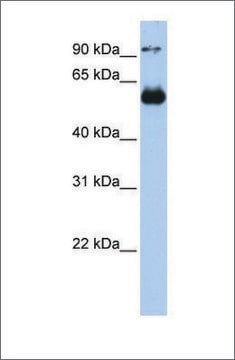05-175
Anti-Myb Antibody, clone 1-1
clone 1-1, Upstate®, from mouse
Synonym(s):
Avian myeloblastosis viral (v-myb) oncogene homolog 2 c-myb protein (140 AA), v-myb avian myeloblastosis viral oncogene homolog, v-myb avian myeloblastosis viral oncogene homolog, v-myb myeloblastosis viral oncogene homolog, v-myb myeloblastosis viral on
About This Item
Recommended Products
biological source
mouse
Quality Level
antibody form
purified immunoglobulin
antibody product type
primary antibodies
clone
1-1, monoclonal
species reactivity
mouse, human
manufacturer/tradename
Upstate®
technique(s)
immunohistochemistry: suitable
immunoprecipitation (IP): suitable
western blot: suitable
isotype
IgG2aκ
NCBI accession no.
UniProt accession no.
shipped in
dry ice
target post-translational modification
unmodified
Gene Information
human ... MYB(4602)
General description
Specificity
Immunogen
Application
4 μg of previous lot immunoprecipitated Myb from Jurkat cell lysate.
Immunohistochemistry:
Epigenetics & Nuclear Function
Transcription Factors
Quality
Western Blot Analysis:
0.5-2 μg/mL of this lot detected Myb in 20 μg of RIPA lysate from Jurkat cells.
Target description
Physical form
Storage and Stability
Analysis Note
Positive Antigen Control: Catalog #12-303, Jurkat cell lysate.
Other Notes
Legal Information
Disclaimer
Not finding the right product?
Try our Product Selector Tool.
Storage Class Code
12 - Non Combustible Liquids
WGK
WGK 1
Flash Point(F)
Not applicable
Flash Point(C)
Not applicable
Certificates of Analysis (COA)
Search for Certificates of Analysis (COA) by entering the products Lot/Batch Number. Lot and Batch Numbers can be found on a product’s label following the words ‘Lot’ or ‘Batch’.
Already Own This Product?
Find documentation for the products that you have recently purchased in the Document Library.
Our team of scientists has experience in all areas of research including Life Science, Material Science, Chemical Synthesis, Chromatography, Analytical and many others.
Contact Technical Service







